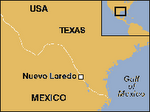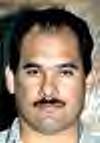By Frank Levine
MEXICO CITY (May 10,2006)--There are rumors of war drifting across the Mexican landscape, like tiny wisps of smoke from a long-dormant volcano. It may not be war in the true sense of the word, as there are yet no massive armies in the field, no bombs bursting, cities burning, or streams of terrified refugees.
But the country is facing an unparalleled seismic political, social, and economic upheaval for the first time since the Revolution. Such an upheaval could push the nation into utter chaos, while further threatening the vunerable southern flank of the United States.
Some believe Mexico will elect a Left-leaning populist president in July, overtly hostile to American interests and foreign policy. Such an election, according to U.S. analysts, could result in widespread civil unrest and international conflict, similar to what occurred recently in Venezuela, with the United States supporting the political opposition--the wealthy oligarchy and business interests--while subverting a democratically elected government.
The consequences for U.S.-Mexico relations could be grave.
Although President George W. Bush is ready to announce the deployment of National Guard troops along the border in a "supportive role" to stem the tide of undocumented workers, Mexican analysts see this further militarization of the border as a strong message that the United States will protect its interests in Mexico; while at the same time stemming the flow of unchecked immigration.
In a way, a real line has been drawn in the sand along the Rio Grande.
The move is seen as politically expedient for a U.S. president on thin ice; while at the same time serving as a warning to the Mexican people that any radicalization of Mexican politics and threats to "business as usual" between the countries, would surely have severe consequences.
"If Mexico elects Andres Manuel Lopez Obrador, a populist candidate in the mold of Venezuela's Chavez, rest assured the United States will not stand idly by while Mexico becomes one more oil-producing country hostile to American interests," one analyst observed.
In a world where true friends of the United States can be counted on one's fingers, it is unlikely the United States will stand by, while a government hostile to American interests is at its border.
Already, there are rumors of assassination plots and U.S. intelligence operations directed at undermining Lopez Obrador's campaign. If he does win, many believe his administration would be severely undermined by a host of domestic and international enemies.
A Lopez Obrador victory, however, is not assured, even without the foreign and domestic conspiracies and plots.
Historically, the Mexican electorate, when confronted with a choice between a relatively progressive candidate "outsider," and a known moderate or conservative--regardless of their history of malfeasance and corruption-- the progressive invariably loses...At least in most of the elections since 1940, or since the imposition of presidential candidate Avila Comacho by the country's ruling oligarchy, with the unbridled support of covert U.S. operations.
"The United States has a long history of corrupting the Mexican political process," said Roberto Zaragoza, a political analyst in Mexico City. " If they can't buy influence, then they simply take it through brutal force."
Sure, often the losses are attributed to electoral fraud, but even in Mexico, consistent fraud on such a wide scale is virtually impossible. The fault, more often than not, rests with the defeated, many of whom have never learned that most of the electorate would rather eat today, than dream of tomorrow. There is little time or energy left among the masses to contemplate and debate lofty ideological principles.
"Although it is distasteful, most Mexicans will vote for someone they can count on being who they are, even if they are crooks and liars," said one newspaper executive. "The problem with many candidates on the Left is that they are often perceived hiding personal agendas and greed behind a flimsy wall of progressive rhetoric; whereas the more conservative candidates -- equally corrupt and hypocritical--seem to present their corruption and hypocrisy openly, almost as a given."
Sunday, April 30, 2006
Mexico braces for wave of political violence
Posted by
Frank Levine
at
01:30
0
comments
![]()
Labels: elections, intelligence, intervention, mexico, political violence, populist, revolution
Subscribe to:
Posts (Atom)






